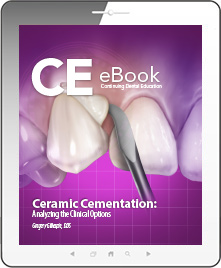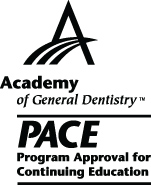CDEWorld > eBooks > Zirconia Cementation: Increasing Predictability


ADA CERP is a service of the American Dental Association to assist dental professionals in identifying quality providers of continuing dental education. ADA CERP does not approve or endorse individual courses or instructors, nor does it imply acceptance of credit house by boards of dentistry. Concerns or complaints about a CE provider may be directed to the provider or to ADA CERP at www.ada.org/cerp/

Approved PACE Program Provider. FAGD/MAGD credit. Approval does not imply acceptance by a state or provincial board of dentistry, or AGD endorsement. 1/1/2023 to 12/31/2028. ID # 209722.
eBook
Released: Friday, August 25, 2017
Expires: Monday, August 31, 2020
Zirconia Cementation: Increasing Predictability
By Gregory Gillespie, DDS
Commercial Supporter: Doxa
Too often, clinicians use the ceramic type of restoration as the first consideration for the type of cement to use, and preparation design becomes the last factor contemplated. This article explains how in order to maximize the effectiveness of ceramic restorations, clinicians need to determine the process by which they select which cement to use in every indirect cementation process and to understand how zirconia differs from classic glass ceramics. Solid understanding of these two elements will increase the long-term predictability of indirect zirconia restorations, improving relationships with patients and decreasing stress points in daily schedules.
LEARNING OBJECTIVES:
-
Review important factors in determining type of cement to use.
-
Clarify the advantages and disadvantages of different cements.
-
Describe the different priming techniques for bonding zirconia restorations.
About the Author
Dr. Gregory Gillespie is in private practice in Vancouver, Washington.
Download FREE eBook now!

